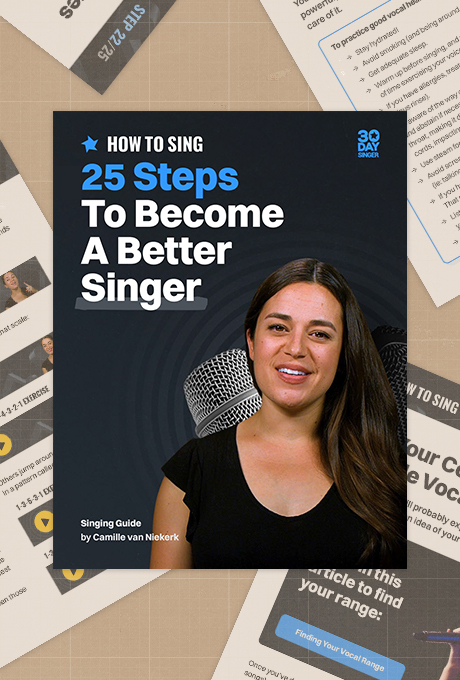Can You Improve?
July 9, 2021
Can I Really Improve, Or Are People Just Born Singers?
Camille van Niekerk
The short answer is: yes, you can improve! But let’s talk about why we feel that’s not true and what we can practically do to see improvement.
Singing seems like a talent rather than a learned skill because:
1. We use our voices all the time! It doesn’t make sense that singing should be so difficult, when you have no trouble using your voice to speak. If you don’t know the difference between your “speaking voice” (or “chest” register) and your “singing voice”(which includes your chest register, head register, and “mixed” coordination of the two), then you’ll approach singing as you do speaking and run into problems when you try to sing pitches significantly higher than your speaking voice is pitched.
2. We don’t think of informal training as “real” training. There are plenty of “untrained” or “self-taught” singers who have incredible tone, control, and range - without ever having taken a voice lesson. How can that be, if singing is a learned skill and not purely a talent? Those singers have been taught: by every singer they grew up listening to. They might not use scales to warm up or “fancy” terminology, but they’ve learned about dynamics, tone quality, vowel modification, phrasing and more, just by listening and imitating what they hear. I’d venture to say that every “naturally gifted” singer has a lot of listening and informal practice under their belt, and that many of the “best” singers are also the best imitators.
3. Looks can be deceiving. Unlike the guitar or the piano, the vocal instrument (specifically the vocal folds within your larynx) are hidden. What you do see and hear can give you a false impression of what the singer is actually doing. For example, you may hear a loud, strong sound and see the singer opening their mouth tall and wide. But when you try to do the same thing, your voice begins to strain and maybe even crack. You see the “finishing touches” of belting without seeing the stable larynx or hearing the subtle vowel modification the singer is employing to avoid straining and cracking themselves. You certainly don’t think of the time they’ve spent training their voice to sing that very note.
4. Your voice doesn’t sound the way you think it does. Almost every beginning singer I’ve worked with tells me they don’t like the sound of their own voice. I’m a professional singer and teacher, and it took me a few years of consistently recording and listening to my own vocals before I could hear myself without that cringe-inducing, “please let me leave the room” feeling overcoming me. The point is: you’re not alone! Read the following article to learn the science behind this phenomenon: https://www.livescience.com/55527-why-people-hate-the-sound-of-their-voice.html.
Alright! Now, what can I do to improve, and how do I know if I’m actually making progress?
1. First, start training your ears! There’s no getting around it: you can’t sing well if you’re singing out of tune. See this article for some tips to get you started: https://www.30daysinger.com/blog/how-to-tell-if-you-re-singing-in-tune-using-free-websites-apps-to-improve-your-pitch-accuracy. Here are a few app recommendations (free or inexpensive): https://musiciantuts.com/ear-training-apps/. And here’s the #1 musicianship app, if you’re willing to pay a little more (currently$3.99/month): https://www.earmaster.com/. You’ll know you’re making progress in this area when your scores improve on your app of choice, and when you’re advancing to higher levels.
2. Determine your comfortable vocal range and use that range to search for warmups and songs that will suit your voice well: https://www.30daysinger.com/blog/finding-your-vocal-range.
3. Commit to at least 5 minutes of daily vocal exercise. 5 minutes is better than none at all! If you do have more time, aim for a 10 to 15-minute vocal warmup. Tracking progress here is difficult without a teacher, but here are a few ideas:
•Comfort level: can you sing with more ease than you used to?
•Reliability: is your voice cracking or “disappearing”less than before?
•Range: can you sing and sustain pitches that used to be out of your reach (orthat you could reach, but used to feelstrained?)
•Strength: can you sing with power from your body, rather than pushing or squeezing from your throat?
•Tone quality: is your tone more consistent?
•Vowels: do your vowels maintain their beauty throughout your range (in other words: do you know how to modify your vowels well)?
•Registration: are you able to access your different vocal registers, and can you more easily transition between them?
4. Select songs that are a good fit for your voice and begin rehearsing! My best tip in this area for beginners is to choose songs with a relatively small range and look for a higher or lower key if the original doesn’t sit comfortably with your voice. Here’s a good place to start: https://www.30daysinger.com/blog/how-to-choose-a-good-song-for-your-voice-considering-range-registration-and-style. To track your progress, record yourself every month or so and listen back, making note of things you’re doing well and things you still want to improve. With singing, you’re never “done”. Your voice is something you continue to adjust, grow, and maintain.
Final thoughts: Think of singing like any other learned skill. Of course, there will be “naturally gifted” swimmers, but we can all learn the strokes and increase our speed with practice. Not everyone will play golf like Tiger Woods, but we can all work on our swing and improve our game. As long as you think of singing as a talent that you “just don’t have”, you won’t work for improvement. Your competition isn’t other singers – it’s you!
See below for a few articles with more ideas on improving your voice: https://www.30daysinger.com/how-to-sing, https://www.30daysinger.com/blog/how-to-improve-your-singing-voice-steps-to-follow-for-self-study, https://www.30daysinger.com/blog/getting-better-fast-when-will-i-hear-improvement-in-my-voice


